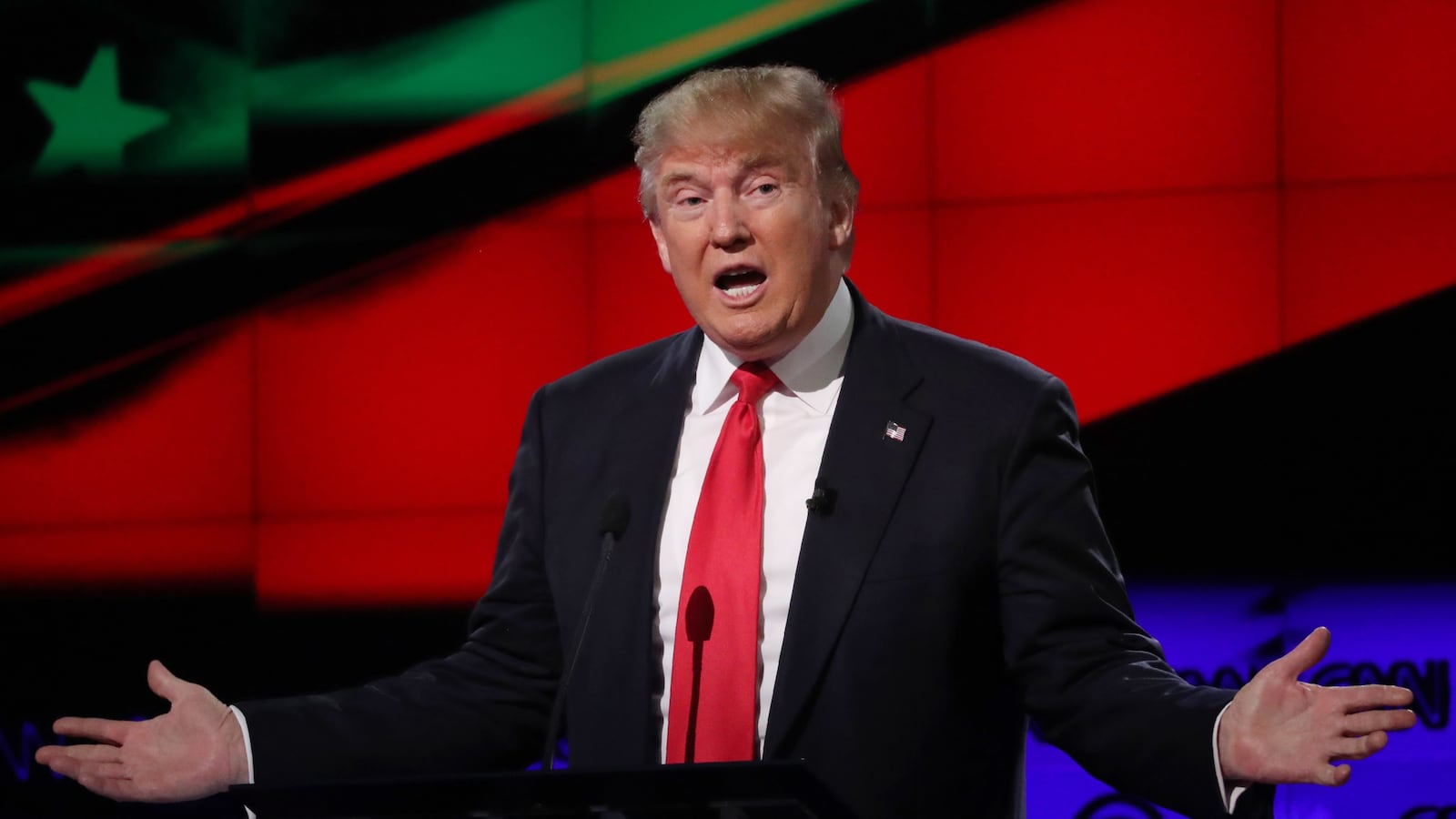“So far I cannot believe how civil it’s been up here!” Donald Trump said Thursday night, looking out from the stage of the Republican debate in Miami, Florida.
Trump had hardly raised his voice beyond a whisper, he hadn’t boasted about his sizable appendage down south, and nobody had called him a con artist or the dean of a phony university.
This, despite the fact that the Florida and Ohio primaries are just six days away, making Thursday night’s debate the last opportunity for Ted Cruz and Marco Rubio, Trump’s central opponents, to tear him down in front of an audience of millions before votes are cast.
It was the debate that dealt with everything calmly—including the issue of violence.
And what a shame.
Because more than at any other time in his nine-month campaign for the Republican presidential nomination, the word civil does not apply to Trump or his operation this week.
The lack of civility began Tuesday night in Jupiter, Florida.
Trump had just delivered a victory speech at the Trump National Golf Club after winning primaries in Michigan and Mississippi. He descended from the stage to answer questions from the press, but when he got to Michelle Fields, a journalist for Breitbart, his campaign manager, Corey Lewandowski, violently grabbed her by the arm and yanked her out of the way, bruising her, according to a Washington Post report and Fields’s own account of the incident, which included a photo of the injury.
The Trump campaign has responded with vehement denial and a sexist smear against Fields.
Then, on Wednesday, at a rally in Fayetteville, North Carolina, a 78-year-old Trump supporter named John McGraw sucker-punched a black protester in the face, according to multiple videos. The protester was detained, and later, McGraw was charged. He told Inside Edition, “he deserved it. The next time we see him, we might have to kill him.”
If you’re keeping track, as Slate is, these were the ninth and 10th violent incidents to take place at Trump events since his June 16 announcement. The Trump campaign has fostered a culture of violence wherein intimidation and regular assaults on civilians and the media—or anybody not wearing a Make America Great Again! hat—is acceptable.
The debate touched on it only briefly.
“Do you believe you’ve done anything to create a tone where this kind of violence would be encouraged?” CNN’s Jake Tapper, the moderator, asked Trump—referring to the assault of the protester, not the assault of Fields.
“I hope not, I truly hope not,” Trump said. And then he explained the violence away by saying it was all due to passion and patriotism.
“We have 25, 30 thousand people, you’ve seen it yourself. People come with tremendous passion and love for the country,” he said, “when they see what’s going on in this country they have anger that’s unbelievable. They love this country. They don’t like seeing bad trade deals. They don’t like seeing higher taxes. They don’t like seeing a loss of their jobs where our jobs have just been devastated. And I know—I mean it, I see it. There is some anger. There’s also a great love for the country. It’s a beautiful thing in many respects. But I certainly do not condone that at all, Jake.”
When Trump was asked to explain his violence-stoking rhetoric—like, on Feb. 23, when he said he wanted to “punch” a protester “in the face”—Trump erroneously claimed that protesters at his events had been violent in the past.
Rather than correct Trump or condemn the behavior of his supporters and staff members, his opponents deflected questions about violence even better than he did.
“Listen, I think for every one of us, we need to show respect to the people,” Cruz said.
And then he veered off into another universe entirely.
“You know, we’ve seen, for seven years, a president who believes he’s above the law, who behaves as an emperor… Turn the camera around here. How many of y’all feel disrespected by Washington?”
And John Kasich? “I worry about the violence at rallies, period,” he said.
And then, quickly, “Jake, here’s what I think is happening: There are people out there who are worried about their jobs.”
But Rubio did worst of all. “I’m concerned about violence in general in the society,” he said, “and by the way, the first people who are facing that violence are our law enforcement officers and they deserve our respect and our thanks for everything they do for us. On the issue of anger, yes, people are angry, of course they’re angry—every institution in America has been failing us for the better part of 20 or 30 years!”
The issue was not anger, you’ll recall, but violence. And then somehow we ended up discussing the moon landing.
“My grandfather was born in 1899, before there were airplanes in the sky,” Rubio said, for what reason it wasn’t clear. “One night in the summer of 1969, he watched a man set foot on the moon.”
And what about the hand that set foot on the reporter’s arm? Or the fist that set foot on the protesters face?
Well, this debate was just too civil to dwell much on any of that.





